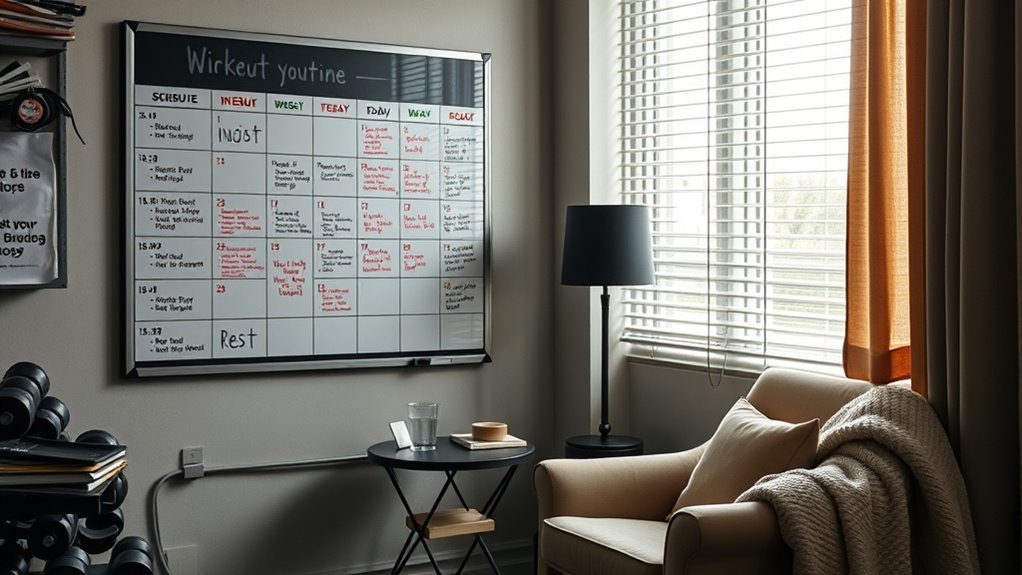Many people think working out every day or increasing workout frequency speeds up results, but that’s not true. Rest days are essential for muscle recovery and avoiding burnout. Rigid schedules can become boring and limit progress, so flexibility helps keep you motivated. Overtraining can cause injuries and decrease motivation, so a balanced plan with proper recovery is key. Keep going, and you’ll discover how to optimize your exercise routine for long-term success.
Key Takeaways
- Exercising every day isn’t necessary; rest days are vital for recovery and progress.
- More frequent workouts don’t speed up results and can lead to overtraining.
- Strict schedules lack flexibility, which can cause burnout and reduce motivation.
- Rest and recovery are essential for muscle repair and injury prevention.
- Rigid routines can cause boredom; variety and adaptability improve long-term consistency.
Believing You Must Exercise Every Day

Many people believe they must exercise every single day to see results, but that’s not true. Rest days are essential for allowing your muscles to recover and prevent burnout. Overtraining can lead to injuries and decreased motivation, so listening to your body is crucial. Instead of hitting the gym daily, focus on incorporating workout variety, which keeps your routine engaging and targets different muscle groups. This approach helps you build strength and endurance without overexerting yourself. Remember, consistent but balanced exercise, including scheduled rest days, promotes steady progress. Pushing too hard every day isn’t necessary and can set you back. Prioritize quality workouts with adequate recovery, and you’ll see better results over time. Utilizing protective styling benefits can also support your fitness journey by reducing the need for frequent styling and upkeep.
Thinking More Frequency Means Faster Results

While taking rest days is important, some believe that increasing workout frequency will lead to faster results. However, this isn’t always true. Overtraining risks rise when you push too hard without adequate recovery, leading to fatigue and injury. More isn’t necessarily better; beyond a certain point, you hit diminishing returns. Your body needs time to repair and adapt, so exercising excessively can stall progress rather than accelerate it. Instead of focusing solely on frequency, prioritize quality and consistency. Proper rest allows muscles to rebuild stronger, making your workouts more effective. Remember, smarter training beats simply training more. Balancing workout days with rest ensures you avoid overtraining risks and keep progressing safely.
Relying Solely on a Fixed Schedule Without Flexibility

Relying exclusively on a fixed workout schedule can limit your progress and increase the risk of burnout. Life’s unpredictable, and sticking rigidly to a plan may cause missed sessions or frustration. Adaptive scheduling offers flexibility benefits, allowing you to adjust workouts based on your energy, recovery, or unexpected commitments. This approach keeps you motivated and consistent. Incorporating work-life balance principles into your routine can further enhance your overall well-being and prevent burnout.
Overlooking the Importance of Rest and Recovery

Neglecting the significance of rest and recovery can considerably hinder your fitness progress. Without adequate rest, your body can’t repair muscles, restore energy, or prevent injuries. Recognizing the recovery benefits helps you avoid burnout and overtraining, which can stall or reverse gains. Rest allows your nervous system to reset, improving performance and reducing fatigue. Incorporate scheduled rest days or lighter activity periods to optimize results. Many overlook that recovery isn’t just downtime; it’s an active process vital for muscle growth and adaptation. Ignoring rest can lead to decreased motivation and increased risk of injury. Prioritize rest importance in your schedule to ensure your body heals and strengthens, making your workouts more effective and sustainable in the long run. Additionally, understanding the role of muscle support can help tailor your recovery strategies for better overall results.
Assuming Strictly Structured Routines Are the Only Path to Success

Many believe that only highly rigid, precisely scheduled routines lead to successful fitness results, but this isn’t necessarily true. Flexibility can actually enhance habit formation and sustain motivation strategies. Relying solely on strict routines may cause burnout or boredom, making it harder to stay consistent. Instead, consider these approaches:
Flexibility boosts consistency and keeps motivation alive in your fitness journey.
- Incorporate variety to keep workouts engaging and prevent plateaus.
- Build habits gradually, allowing room for adjustments without losing momentum.
- Use flexible timing to fit exercise into unpredictable schedules.
- Focus on progress, not perfection, to maintain motivation and reinforce positive behaviors.
- Exploring different training styles can help prevent stagnation and keep your fitness journey exciting.
Frequently Asked Questions
How Do I Adapt My Schedule During Busy or Unpredictable Weeks?
When your week gets busy or unpredictable, embrace flexible scheduling to stay consistent. Prioritize your workout by adjusting the time and intensity, focusing on shorter, more efficient sessions if needed. Use smart time management, like planning workouts in advance or squeezing them into gaps, so your exercise routine remains steady. This way, you adapt seamlessly without sacrificing progress, even during hectic weeks.
Can I Mix Different Types of Workouts in One Week Effectively?
You can definitely mix different types of workouts in one week and still see great results. It adds an element of training variety, keeps things interesting, and prevents plateaus. Just make certain you maintain workout consistency, balancing cardio, strength, and flexibility sessions. Coincidentally, switching up your routine can boost motivation and prevent burnout, helping you stay committed longer. So go ahead, diversify your workouts—your body will thank you for the variety!
What Are Signs I Need More Rest or Recovery Days?
If you notice persistent fatigue, irritability, or sleep deprivation, you likely need more rest or recovery days. Overtraining symptoms often include muscle soreness that doesn’t improve, decreased performance, and frequent illnesses. Listen to your body—if you’re feeling unusually exhausted or unable to recover, it’s a sign to take extra rest. Incorporating recovery days helps prevent injury, boosts your progress, and guarantees you’re well-rested for your next workout.
How Do I Stay Motivated Without a Strict Routine?
To stay motivated without a strict routine, focus on mindset shifts like celebrating small wins and staying flexible. Find accountability partners who encourage you and keep you on track, making exercise feel less like a chore. Mix up your activities to keep things fresh and enjoyable. Remember, consistency matters more than perfection—so adapt your schedule as needed and stay committed to your health journey.
Is It Okay to Skip Planned Workouts Occasionally?
Yes, it’s okay to skip planned workouts occasionally. Flexibility in scheduling helps you stay consistent without feeling overwhelmed by spontaneity. Life happens, and missing a session doesn’t mean you’ve failed. Prioritize balance by allowing some wiggle room, which keeps you motivated and less likely to burn out. Remember, maintaining a sustainable routine is more important than perfection; occasional skips can actually enhance your long-term progress.
Conclusion
Remember, your exercise schedule isn’t just about ticking boxes; it’s about listening to your body and embracing flexibility. Sometimes, the best progress comes when you least expect it—like a rest day turning into a breakthrough. Don’t get caught up in rigid rules. Instead, trust that your unique rhythm and small adjustments can lead to lasting success. After all, the right plan is the one that fits you—often when you’re not even trying.









